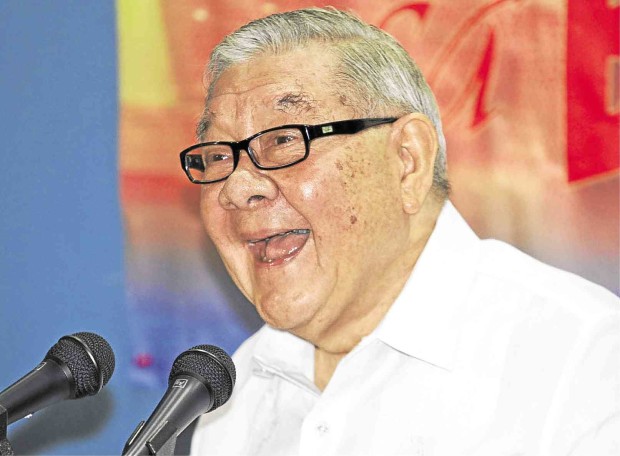
House Speaker Sonny Belmonte Jr. Presscon at the House of Representatives in Batasan Quezon City. INQUIRER FILE PHOTO / LEO M. SABANGAN II
Speaker Feliciano Belmonte Jr. on Friday lauded the 10-point economic agenda of President-elect Rodrigo Duterte.
In a statement, the outgoing Speaker of the House of Representatives said Duterte’s economic agenda prioritizes the budgetary need for inclusive growth in the economy.
The 10-point economic agenda was laid out before 300 business leaders in Davao City last June 20 to 21 at a consultative workshop called “Sulong Pilipinas: Hakbang Tungo sa Kaunlaran.”
READ: Duterte economic team to present 10-point agenda before bizmen
Belmonte, a vice chair for the Liberal Party, added that Duterte’s 10-point economic agenda particularly caters to the sectors of the economy where the marginalized thrive—the agriculture and manufacturing sectors.
“The Duterte economic plan laid out at the Davao Business Summit clearly pivots the budget towards the agriculture sector where the majority of the poorest Filipinos are. By adopting the regional growth center approach the Duterte administration further ensures that the poorest provinces will be first in line,” Belmonte said.
READ: Alvarez a cinch for speakership as Belmonte sees possible loss
“The plan seeks to revive the manufacturing sector because that is where decent jobs with decent wages can be generated as opposed to precarious, subsistence salaries in the service sector. It is an empowering vision for our people, bold in taking on the harder path of building prosperity with the poor, and daring in pushing greater equality in our society,” he added.
Belmonte urged the incoming 17th Congress to provide the necessary funding in the 2017 General Appropriations Act (GAA) for the Duterte administration to accomplish its economic agenda.
“It is not only our responsibility in Congress to look into each item of the detailed economic program, but also to ensure the necessary funding will be available to fully implement the agenda for the welfare of the people and the nation,” Belmonte said.
He also said the incoming Congress should adjust its budget schedule to allow incoming Budget Secretary Benjamin Diokno to submit the proposed 2017 GAA two to three weeks after Duterte’s State of the Nation Address (Sona).
The Aquino government submits its budget bill just days after the President’s Sona.
“I think it’s a reasonable schedule since the incoming administration is just starting and needs time to study well every item in next year’s General Appropriations Bill for proper justification before the House committee on appropriations. On the part of House, we can adjust the hearings of the appropriations committee so there will be no delay in the approval of the budget and avoid a reenacted national budget next year,” Belmonte said.
Duterte’s 10-point socioeconomic roadmap includes:
- Continuing and maintaining the current macroeconomic policies, including fiscal, monetary and trade policies instituting progressive tax reform and more effective tax collection while indexing taxes to inflation, in line with the plan to submit to Congress a tax reform package by September;
- Increasing competitiveness and the ease of doing business, drawing upon successful models used to attract business to local cities such as Davao, as well as pursuing the relaxation of the Constitutional restrictions on foreign ownership, except with regards land ownership, in order to attract foreign direct investments;
- Accelerating annual infrastructure spending to account for 5 percent of the gross domestic product, with public-private partnerships playing a key role;
- Promoting rural and value chain development toward increasing agricultural and rural enterprise productivity and rural tourism;
- Ensuring security of land tenure to encourage investments and address bottlenecks in land management and titling agencies;
- Investing in human capital development, including health and education systems, as well as matching skills and training to meet the demands of businesses and the private sector;
- Promoting science, technology and the creative arts to enhance innovation and creative capacity towards self-sustaining and inclusive development;
- Improving social protection programs, including the government’s conditional cash transfer program, in order to protect the poor against instability and economic shocks; and
- Strengthening the implementation of the Responsible Parenthood and Reproductive Health Law to enable, especially, poor couples to make informed choices on financial and family planning. RAM/rga